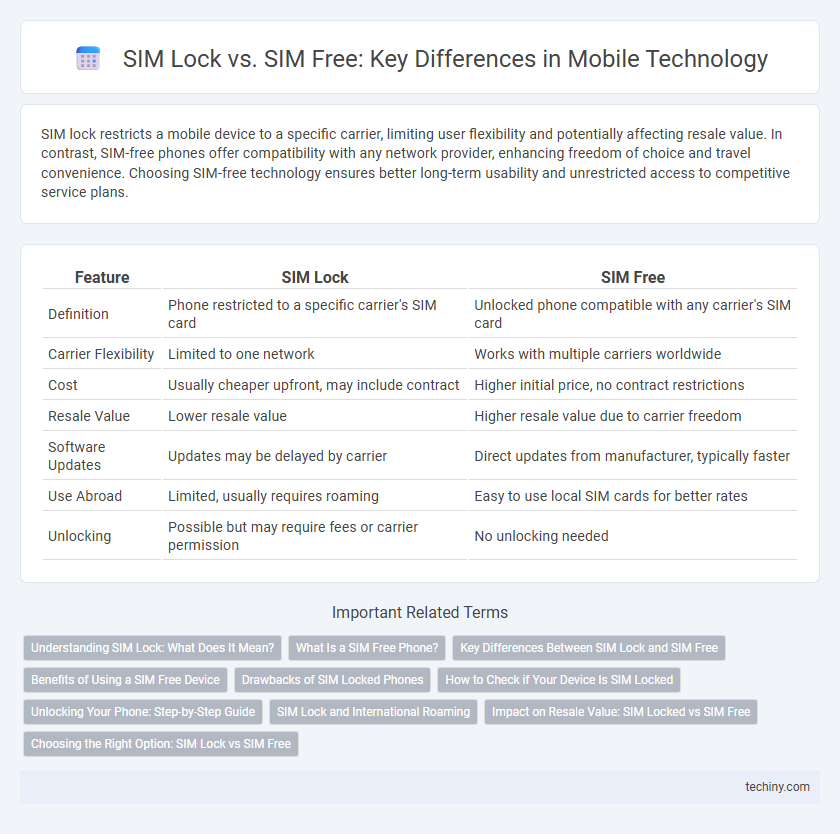SIM lock restricts a mobile device to a specific carrier, limiting user flexibility and potentially affecting resale value. In contrast, SIM-free phones offer compatibility with any network provider, enhancing freedom of choice and travel convenience. Choosing SIM-free technology ensures better long-term usability and unrestricted access to competitive service plans.
Table of Comparison
| Feature | SIM Lock | SIM Free |
|---|---|---|
| Definition | Phone restricted to a specific carrier's SIM card | Unlocked phone compatible with any carrier's SIM card |
| Carrier Flexibility | Limited to one network | Works with multiple carriers worldwide |
| Cost | Usually cheaper upfront, may include contract | Higher initial price, no contract restrictions |
| Resale Value | Lower resale value | Higher resale value due to carrier freedom |
| Software Updates | Updates may be delayed by carrier | Direct updates from manufacturer, typically faster |
| Use Abroad | Limited, usually requires roaming | Easy to use local SIM cards for better rates |
| Unlocking | Possible but may require fees or carrier permission | No unlocking needed |
Understanding SIM Lock: What Does It Mean?
A SIM lock restricts a mobile device to operate only with a specific carrier's SIM card, preventing the use of different network providers. This limitation is commonly imposed by carriers to ensure contract compliance or recover device subsidies. Understanding SIM lock is crucial for consumers seeking flexibility in switching carriers or using international SIM cards without restrictions.
What Is a SIM Free Phone?
A SIM free phone is a mobile device sold without any carrier restrictions, allowing users to insert a SIM card from any network provider. This unlock status provides freedom to switch carriers or use local SIM cards when traveling internationally, enhancing flexibility and cost savings. Unlike SIM locked phones, SIM free models offer unrestricted access to all compatible SIM cards globally.
Key Differences Between SIM Lock and SIM Free
SIM Lock restricts a mobile device to operate only with a specific carrier's SIM card, limiting user flexibility and network choice. SIM Free phones are unlocked devices compatible with any carrier's SIM card, offering greater freedom and easier international roaming. Key differences include network restriction, resale value, and ease of carrier switching.
Benefits of Using a SIM Free Device
A SIM free device provides unparalleled flexibility by allowing users to switch carriers without restrictions, facilitating cost savings through access to diverse mobile plans and international SIM cards. It enhances convenience during travel by enabling seamless connectivity across different countries without incurring roaming charges. Furthermore, SIM free phones often retain higher resale value due to the absence of carrier limitations.
Drawbacks of SIM Locked Phones
SIM locked phones restrict users to a specific carrier, limiting the flexibility to switch networks or use local SIM cards while traveling, often resulting in higher roaming charges. These devices typically reduce resale value and complicate unlocking processes that may require carrier authorization or fees. Firmware updates and customer support can also be constrained by the carrier, potentially delaying access to new features or security patches.
How to Check if Your Device Is SIM Locked
To check if your device is SIM locked, insert a SIM card from a different carrier and attempt to make a call or send a text; if the device rejects the SIM or displays an error message like "SIM network unlock PIN," it is likely locked. You can also navigate to the device settings or use carrier-specific apps to verify lock status. Contacting your carrier with your device's IMEI number provides a definitive status and unlock options.
Unlocking Your Phone: Step-by-Step Guide
Unlocking your phone involves removing the SIM lock, allowing it to accept SIM cards from any carrier. Begin by obtaining the unlock code from your current service provider or using a reputable unlocking service, ensuring your device meets eligibility criteria. Enter the code into your phone following manufacturer instructions, which grants access to network flexibility and enhances resale value.
SIM Lock and International Roaming
SIM-locked phones restrict users to a specific carrier, limiting flexibility when traveling internationally and often requiring expensive roaming fees. International roaming charges on SIM-locked devices can significantly increase costs due to carrier-specific agreements and lack of access to local networks. Unlocking the SIM allows users to switch to local SIM cards, reducing roaming expenses and improving connectivity abroad.
Impact on Resale Value: SIM Locked vs SIM Free
SIM-free phones consistently command higher resale value due to their compatibility with any carrier, offering buyers greater flexibility and convenience. SIM-locked devices typically sell for less, as they restrict usage to specific networks and require unlocking fees or procedures which deter potential buyers. Market data shows that SIM-free models retain up to 20% more value compared to their locked counterparts, reflecting strong consumer preference for unrestricted mobile technology.
Choosing the Right Option: SIM Lock vs SIM Free
Choosing between SIM lock and SIM free depends on user flexibility and carrier preferences. SIM locked phones are usually tied to a single carrier, often offering subsidized prices but limiting network options. SIM free devices provide full freedom to switch carriers and use any compatible SIM card, making them ideal for frequent travelers and those seeking long-term carrier freedom.
SIM Lock vs SIM Free Infographic

 techiny.com
techiny.com